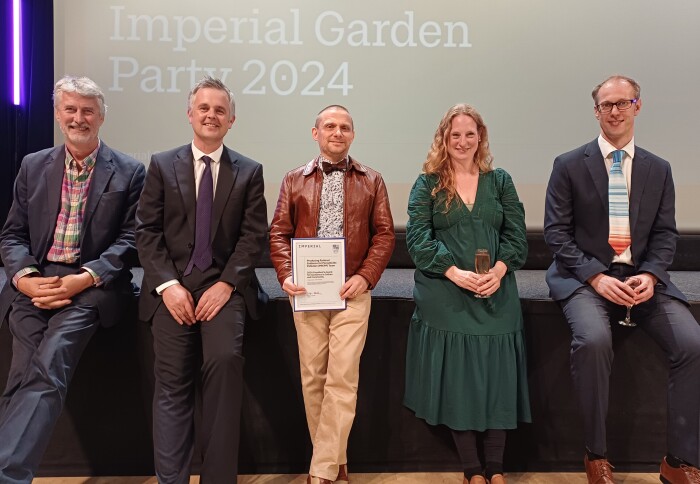Research on environmental risks of pet parasiticides receives President’s Award
by Jamie Taylor

The PREPP research group at the President's Award ceremony
An interdisciplinary research group showing the environmental risks of pet parasiticides has received Imperial College London's President's Award.
The award, in the category of Excellence in Culture and Community, follows high-profile coverage of PREPP (Producing Rational Evidence for Parasiticide Prescription) research showing common parasiticides used to treat flea infections have contributed to extensive river water contamination.
Research by the PREPP group revealed the main sources of this widespread contamination in waterways were urban wastewater discharges consistently carrying two common insecticides used in flea treatments, fipronil and imidacloprid. The latter has been banned for outdoor use in the EU and UK since 2018 as a result of its negative impact on bees.
The group have also provided evidence that flea and tick medications are of high risk to critical aquatic invertebrates, which normally clean our rivers.
The work of PREPP evaluates the pathways, impacts and potential solutions to limit the environmental risks posed by common parasiticides. It made several recommendations to reduce the risks they pose in their March 2023 briefing paper.
The group advocate for a significant reduction in the administering of common flea treatments, in particular arguing against the use of routine preventative flea medication. They recommend strengthening regulatory assessment; improving information for users; better product labelling on how to correctly use and dispose of products; advice on alternative methods of parasite control; and raising awareness of parasiticide use as an environmental risk.
Article text (excluding photos or graphics) © Imperial College London.
Photos and graphics subject to third party copyright used with permission or © Imperial College London.
Reporter
Jamie Taylor
The Grantham Institute for Climate Change